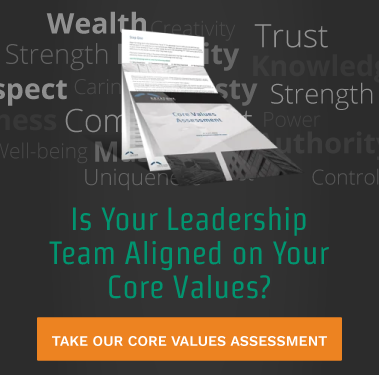We’re sharing two articles, laying out each of the 5 characteristics we believe are key leadership attributes that can make or break the effectiveness of an ESOP leader. Read Part 1 here.
We’re providing a little insight on how to evaluate candidates (internal or external) against these characteristics. Our hope is these articles may help a bit in making better hiring decisions within your ESOP and generally creating stronger leadership teams in the ESOP community.
Based upon our extensive ESOP experience, we believe there are 5 key leadership attributes of an ESOP Leader 1) Low Ego/Self Esteem 2) Communication 3) People Development 4) Listener and 5) Ability to make decisions.
Download this assessment to learn if your leadership team is aligned on your core values.
ESOP LEADERSHIP QUALITY #4: ACTIVE LISTENER
Not only are the best leaders in an ESOP consistent communicators (Quality #2), they also need to be active and engaged listeners.
A good number of employee owners want to share ideas, thoughts and suggestions for improvement in the business. They have a vested interest in doing so. Of course, not all ideas can be implemented, but that’s not usually what’s expected from employee owners. What is expected is they will be listened to and considered.
And this is not just the tired analogy of having “an open door policy.” Open doors do no good if employees are walking down a different hallway to avoid a leaders’ office. Active listeners must solicit feedback, meaning they must ask for it. They need to be willing and interested in spending time out on the shop floor or in the customer service department asking for ideas/feedback.
Unfortunately, many executives in corporate America are not trained or experienced in this type of active listening. Too many companies emphasize and reward quick and individual decision making. The people who are good at this tend to rise into senior leadership, which means finding candidates who truly are active listeners is not always easy.
The good news is they are easy to spot when they are in front of you. Questions like, “Describe an idea that was brought to you by one of your team members?” is great at shining a light on the active listeners. Can they think of an example relatively quickly? If so, they probably have pretty good listening skills. Another is “Who are your best sources of information beyond your direct reports?” Again, if they can’t answer this relatively quickly, they are probably not spending much time out and about amongst the troops.
By the way, don’t fall for the “I have an open door policy” answer. If this is what the individual says, make sure to follow up and ask for examples. How many people just walk into your office? How do you let people know when you’ll be in your office and available to talk?
ESOP LEADERSHIP QUALITY #5: DECISION ORIENTED
We’ve encountered a fair number of senior leaders within ESOPs who have all four of the qualities above, but yet are still not as effective as they could be for one reason - They can’t or won’t make a decision.
While soliciting thoughts and ideas and incorporating them into decision making is critical, at some point the discussion needs to end and a decision has to be made.
Unfortunately, some leaders just have a very hard time letting anyone down and ultimately opt for trying to keep everyone happy vs. making a decision to move the company forward. Obviously, this is not good overall for the health of the company or the ESOP, as the company can become very slow to change and adapt.
The best leaders are those who will take feedback and ideas but also know when to stop and just make the best decision possible for moving forward. This also means they must have the courage to explain to those who may not have agreed with the decision and why another direction was ultimately chosen.
To understand if a leadership candidate can make decisions ask interview questions like the following; “Describe a difficult decision you had to make, one where there were many points of view. How did you ultimately come to decision and how did it all turn out?” And, don’t forget the follow up; “How did you communicate afterwards about the rationale for the decision.”
No question ESOPs are a special type of environment. I marvel at the level of performance, positive attitude/culture and just plain genuineness and integrity of the ESOPs I’ve been lucky to serve.
Even in ESOPs, the inevitable changes in leadership will create change, either a continuation of the positive, or a move toward the negative. For this reason, every leadership hire you make, whether internal or external is critical. Make sure you’re paying close attention to make the best possible hire every time.
Read more about evaluating and hiring the right ESOP leaders here.




